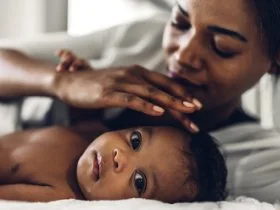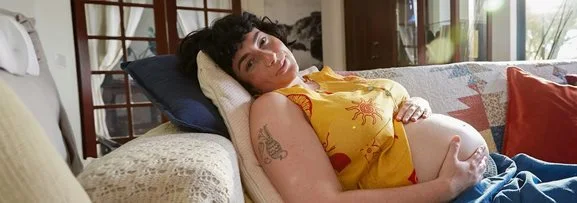Mental Health Commission
Everyone’s experience of pregnancy and parenting is unique. Trying for a baby, pregnancy or having a new baby can be exciting, but it can also be a time where many people experience heightened or new mental health challenges.

There are specialist mental health support services available in Western Australia, for women who are planning to have a baby or in the antenatal (pregnancy or before birth) or postnatal (after birth) period. If you are having fertility issues, you can ask for help or a referral to mental health support through your healthcare provider.
No matter what you’re going through, it’s important to look after your mental health and get help early, if you need it.
There are a number of different mental health issues that can arise during pregnancy and after childbirth.
Specialist Services
There are a range of specialist services that can help you with your health and wellbeing during pregnancy and early parenting. The below list includes specialist perinatal mental health services, as well as self-help tools and information.
Ngala Parenting Line offers free advice to help with any parenting challenges for children aged 0 to 18 years.
Available: 8am to 8pm (daily)
ForWhen provides guidance to new and expecting parents to perinatal and infant mental health supports.
Available: 9am- 4.30pm (Mon-Fri)
Perinatal Anxiety and Depression Australia (PANDA) provides consumer mental health checklists, information for during pregnancy, after birth, postnatal psychosis, help for new fathers, partners and carers, recovery stories, fact sheets and resources, as well as who’s who in perinatal mental health. PANDA provides the national perinatal mental health telephone counselling service, as well information to reduce stigma around perinatal anxiety and depression.
Available: 10am-5pm AEDT (Mon-Fri)
Ngala Parenting Service provides support to parents, families and communities to enhance the wellbeing and development of children and young people. Ngala offers a parenting helpline, day stays and extended stays (four nights) for difficult parenting challenges. This is a non-government service, with low to no cost.
4families is a free family mental health support service run by Relationships Australia WA for children aged 0 to 18 years, and their families and carers. This service is funded by the Australian Government.
Triple P is a parenting program that gives you tips and ideas to help raise happy and confident kids; see more of the behaviours you like and less of the ones you don’t; and have better relationships with your family. It is available to parents and carers of children in WA, supported by the Department of Education, Child and Adolescent Health Service, WA Country Health Service, and Department of Communities.
MumSpace supports the mental health and wellbeing of pregnant women, new mums and their families by connecting them to advice and support in the transition to parenthood. It also provides effective online treatment programs for perinatal depression and anxiety including Mum2BMoodBooster and MumMoodBooster.
Jean Hailes for Women’s Health is based at Monash University and offers online support, self-assessment, toolkits, videos and podcasts. Jean Hailes has also developed What Were We Thinking app, which focuses on the practical and personal aspects of parenting, this program gives you evidence-based, tried and tested parenting advice from leading Australian experts.
SMS4dads provides fathers with information and connection to online services through text messages to their mobile phones.
GPs and psychologists (in private practice) can help with treating or supporting you with mild to moderate mental health issues.
Women’s Health Services in metropolitan and regional centres provide a range of services including health promotion, information, counselling and clinical support. You can also visit Centre for Women's Safety and Wellbeing.
Raphael Services (St John of God Health Care – Not for Profit) offers support for parents through the emotional challenges of pregnancy and early parenthood. Free, with no-out-of-pocket expenses.
Pregnancy to Parenthood Clinic is a community-based early intervention service that provides a free perinatal and infant mental health service focusing on the wellbeing of caregivers and their infants, young children (up to two years old) and families (from pregnancy).
The King Edward Memorial Hospital Mother and Baby Unit provides specialist treatment for mental health issues such as severe depression, anxiety, psychotic disorders in late pregnancy and during the postnatal period. Women are first advised to discuss their mental health concerns with their GP or health care professional, who can then refer them to the MBU (PDF) if necessary.
The King Edward Women and Newborn Drug and Alcohol Service is a tertiary state-wide service providing specialist clinical services and professional support to care for pregnant women with drug and alcohol dependence. They use a multidisciplinary team approach to improve the health and wellbeing of the women and their babies. You can contact the service directly when you discover you are pregnant, or be referred by your GP, health care worker or community service provider.
The Fiona Stanley Hospital Mother and Baby Unit provides specialist treatment for mental health issues such as severe depression, anxiety, psychotic disorders in late pregnancy and during the postnatal period. The unit admits women living within the South Metropolitan Health Service area, as well as rural and remote Western Australia. External referrals will also be considered. Women can choose to be admitted as a public or private patient, with no out-of-pocket costs for Medicare/ privately eligible patients.

Are you a parent looking to support your child’s mental health?
See below for some tips to support the children and young people in your life:
- be there to listen
- stay involved in their life
- take what they say seriously
- support them through difficulties
- encourage their interests
- build positive routines.
This page has been developed thanks to the expertise and support of the Perinatal and Infant Mental Health Sub Network.
Page last updated3 February 2026




